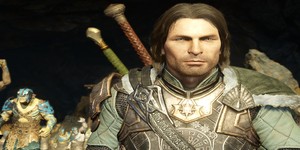
Middle Earth: Shadow of Mordor Review
Price: £39.99Developer: Monolith
Publisher:Warner Bros
Platforms: PC, Xbox One, PS4, PS3, X360
Version Reviewed: PC
I hate Glûk Jitters. I despise his stupid, smug little uruk face more than any enemy in a game I can remember. It all started when he began turning up to fights with other uruk Captains which the skinny git was most definitely not invited to. His abrupt appearance almost always led to my death. Eventually I made it my personal mission to seek him out and put an end to him, which I duly did by shooting an arrow through his eye.
A couple of hours later, however, Glûk Jitters came back, a metal plate covering his now-empty eyesocket which made him invulnerable to ranged attacks. This time I put my sword to him, and yet he returned once more, now resistant to sword-strikes. Like a Whovian Cyberman, he ultimately became unstoppable by any conventional means. Yet he had one enduring weakness, a crippling fear of Caragors, the strange half-bulldog, half horse creatures that roam the wilds of Mordor. I leapt upon the back of one and, upon riding to Glûk 's location, laughed as he squealed with terror and scrambled for the hills. The hunt was on, and it was glorious.
Glance at a screenshot of Shadow of Mordor and you may dismiss it as a hastily assembled Assassin's Creed knock-off, a somewhat dour looking open-world game that cheekily mimics Batman: Arkham Asylum's combat system almost blow-for-blow. It's true that Shadow of Mordor borrows from many games of a similar ilk. But this isn't what the game is about. What it really amounts to is Orc Game of Thrones, with you acting as a cross between the vengeance seeking Arya Stark and the Kingmaking Tywin Lannister. And it really is quite brilliant.
Shadow of Mordor's story revolves around a Gondorian Ranger named Talion. Posted at the Black Gate around the time of Sauron's ascendency (between the stories of the Hobbit and the Lord of The Rings) Talion and his family are murdered by a charming fellow known as the Black Hand of Sauron, in what is possibly the grimmest introduction to a game ever commited to pixels. Somehow, Talion's soul becomes entangled with the spirit of an elf wraith, giving him a temporary stay from death and a chance to exact revenge upon the Black Hand by scouring the land of Mordor and assembling a rebellion against Sauron and his minions.
Initially Shadow of Mordor feels like a generic and particularly messy example of an open world game. Everything you'd expect to see in a game of this genre is here. Story missions that introduce mechanics to you while forwarding the plot, cookie-cutter side-missions which reward you with experience points, at least three upgrade systems, towers you can climb that unlock new areas of the map, a rhythm/counter based combat system. Stealth, ranged attacks, endless collectibles. It's a library of game mechanics that appear to have fallen off the shelf and piled together during an earthquake.
![Middle Earth: Shadow of Mordor Review [FRIDAY] Middle Earth: Shadow of Mordor Review](http://images.bit-tech.net/content_images/2014/10/middle-earth-shadow-of-mordor-review/mordor1-614x345.jpg)
[/center]
All of this it tries to introduce to you within the first half hour, while negating to inform you that you really should play the story for a while before going exploring. The result is an initial experience that is both baffling and fragmentary, as you experiment with multiple systems at once, none of which you fully comprehend.
Fortunately, this situation is very much temporary, and as you grasp what Shadow of Mordor is really about, it reveals itself to be far from the cheap copycat it seems at first. The aforementioned open-world cliché's are merely sideshows to complement the main attraction, Shadow of Mordor's nemesis system.
In the first few hours the nemesis system acts mostly to make things personal between you and a few specific enemies. The uruks whose black blood frequently lubricates your blade are led by "Captains", more powerful uruks with specific named like Glûk Jitters, Rûg Skull-Splitter, and my personal favourite Stakuga the Wrestler. These uruks sport traits such as strengths, weaknesses, hates and fears. In the early stages of the game you'll find yourself regularly stumbling upon these uruk Captains, who announce their arrival with some kind of taunt or insult thrown in your direction. If the uruk Captain defeats you in battle, he increases in power, adding further insult to your mortal injuries. It's a great way of adding a bit of systemic character to what would usually be faceless opponents.
But this isn't even half the story. Uruks don't act independently of one another. They exist in a deeply competitive hierarchy, with nameless grunts at the bottom, Captains in the middle, and Warchiefs at the top. The uruks will regularly kill one another for advancement, engaging in duels, ambushing each other, and executing weaker uruks. If you're killed by a random uruk in battle, he may advance to become a Captain. By the same token, if you kill an uruk during battle, they are removed (sometimes temporarily, sometimes permanently) from the hierarchy.

MSI MPG Velox 100R Chassis Review
October 14 2021 | 15:04

![Middle Earth: Shadow of Mordor Review [FRIDAY] Middle Earth: Shadow of Mordor Review](http://images.bit-tech.net/content_images/2014/10/middle-earth-shadow-of-mordor-review/mordor2-614x345.jpg)
![Middle Earth: Shadow of Mordor Review [FRIDAY] Middle Earth: Shadow of Mordor Review](http://images.bit-tech.net/content_images/2014/10/middle-earth-shadow-of-mordor-review/mordor3-614x345.jpg)
![Middle Earth: Shadow of Mordor Review [FRIDAY] Middle Earth: Shadow of Mordor Review](http://images.bit-tech.net/content_images/2014/10/middle-earth-shadow-of-mordor-review/mordor4-614x345.jpg)
![Middle Earth: Shadow of Mordor Review [FRIDAY] Middle Earth: Shadow of Mordor Review](http://images.bit-tech.net/content_images/2014/10/middle-earth-shadow-of-mordor-review/mordor7-614x345.jpg)








Want to comment? Please log in.